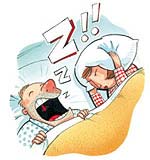Respironics' Attractive Niche Merits Attention
 If you're making money in these utterly adverse, bear market conditions, we salute you. One stock that held up quite well during last week's bloodbath (if you think this rally has legs, you're deadly mistaken; the oil and inflation-induced panic will be with us until the end of June, at least) was medical device maker Respironics (RESP), a $2.6 billion dollar company coughing up $1B in sales through 3,900 employees. Here's our first take on the stock, which was upgraded by Harris Nesbitt just last week.
If you're making money in these utterly adverse, bear market conditions, we salute you. One stock that held up quite well during last week's bloodbath (if you think this rally has legs, you're deadly mistaken; the oil and inflation-induced panic will be with us until the end of June, at least) was medical device maker Respironics (RESP), a $2.6 billion dollar company coughing up $1B in sales through 3,900 employees. Here's our first take on the stock, which was upgraded by Harris Nesbitt just last week.Description Respironics develops and manufactures medical devices for respiratory ailments. The firm generates about half of its sales from equipment and masks that treat sleep apnea. Ventilation systems, particularly noninvasive tools, represent its second largest segment. Two others -- children's medical ventures and respiratory drug delivery -- remain nascent, high growth opportunities that complement the firm's home oxygen product acuity and hospital-targeting therapeutic devices.
Positive Considerations We view RESP as a terrific play on a medical device niche characterized by healthy price points, towering barriers to entry, and high switching costs. RESP's product/service portfolio is centered on sleep apnea and ventilation products.
Sleep apnea is temporary suspension of breathing occurring repeatedly during sleep that often affects overweight people or those having an obstruction in the breathing tract, an abnormally small throat opening, or a neurological disorder. Approximately 6–7% of the population of the United States, or 18 million Americans, are thought to have sleep apnea, but only 10 million have symptoms, and only 0.6 million have yet been diagnosed. In Americans aged 30–60 years, obstructive sleep apnea affects nearly one in four men and one in 10 women; men are twice as likely to have sleep apnea. Although sleep apnea has been more widely diagnosed in the past decade, experts estimate that at least 90–95% of cases remain undiagnosed. Reasons for this include nebulous developing symptoms, limited knowledge of the disease, and expensive testing protocols needed for better diagnoses. Sleep apnea is difficult to diagnose without expensive testing, can aggravate or cause heart and lung problems, often damages quality of life, and could require invasive surgical procedures. As such, we think the medical community will continue to embrace and study the prevention of obstructive sleep apnea over the next several years.
RESP's airflow technology piledrives its rivals' technology straight into the ground: we think that if the firm can sustain a moat around its business, shareholders will be amply rewarded, particularly because this is not a widely followed stock. We like how insiders have been with the company for a long time and how there are no analyst sell recommendations on the Street. Respironics, which has grown sales mostly through acquisition (stock-based), should enjoy economies of scale as it gets bigger and begins to reap the fruit of operating leverage. A quick look at the balance sheet reveals that Respironics' $265M cash horde is 6 x the amount of debt that the firm carries on its books. Not only does this capital structure appeal to us, it suggests RESP will continue buying its competitors as it fleshes out its top line story and magnifies its product reach.
Risks We're sure you've been told a million times: "Careful with medical device stocks -- abrupt reimbursement rate changes can hammer the stock and leave you looking for a bottle of Jack." Well, RESP is no exception. The problem with medical device companies is, we think, twofold: firms needs to restlessly innovate (or else lose market share to superior rival technology) as they deal tirelessly with the vagaries of 3rd party payers. Simply stated, if RESP falls behind the innovation curve and/or customers begin paying more out of their own pocket, shares will take it on the chin. Unfortunately, RESP fails to pass our "5-10% insider holdings test": insiders own less than 2% of the stock, which heightens the risk/reward slightly.
Valuation Analysts are of the opinion that Respironics will earn $1.66 EPS in 2007, representing approximately a 23% jump from 2006 EPS estimates. Today, RESP trades for 21.6 X forward earnings, indicating to us that there is room for upside if our thesis pans out. In addition, RESP sells at a large discount to rival Resmed (RMD) on both a price/sales basis (43% discount) and a trailing 12 month price/earnings basis (68%). We'd gladly pick up shares on weakness.
Don't forget that you can also enjoy our work at SeekingAlpha.com, a must-read according to The New York Times, Barron's, and Forbes.
<< Home